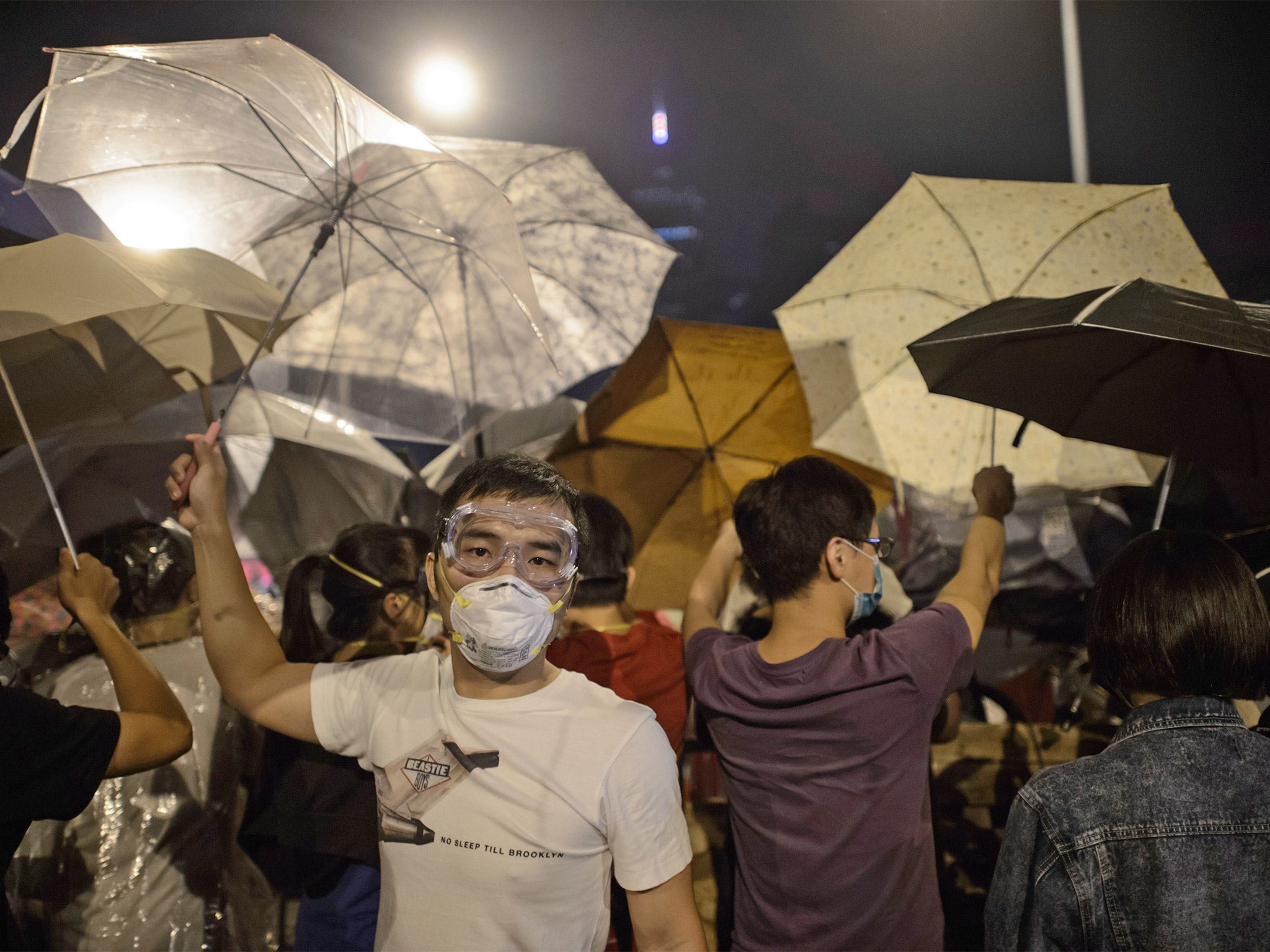Hong Kong protests: Crowds lay siege to police HQ and demand justice as anger grows over beating of pro-democracy demonstrator
James Legge talks to students who have lost all faith in policing following two weeks of unrest in the region

The headquarters of Hong Kong’s police force are under siege as angry protesters demand justice after a savage beating of a pro-democracy protester.
The crowds on Lockhart Road – a short walk from the epicentre of protests which have clogged important districts and drawn the world’s attention to growing Chinese influence in the business hub – swelled to hundreds of people as the evening wore on.
They demanded that witnesses be allowed in to make statements on the attack on Ken Tsang, a member of the Civic Party and volunteer social worker who specialises in projects for street children. Police eventually permitted this to occur .
In the early hours of this morning, during the most violent police crackdown for two weeks, local television filmed six police officers grabbing the handcuffed Mr Tsang and taking him to a secluded spot behind a government block. There, they appeared to take turns punching and kicking him.
He claimed he was beaten later at a police station, adding that he is considering legal action against the police.
The pro-democracy politician Lee Cheuk-yan, said: “Hong Kong police have gone insane today, carrying out their own punishment in private. Hong Kong’s values and its rule of law really have been completely destroyed by police chiefs.”
In pictures: Police push to clear Hong Kong protesters
Show all 19The police spokesman Steve Hui said seven officers who were involved have been temporarily reassigned, and that authorities will carry out an impartial investigation.
Officers arrested about 45 protesters in the swoop on an occupied road tunnel, using pepper spray against those who resisted. The alleged attack dealt another blow to the force’s public image after initial, much smaller, peaceful protests were repeatedly broken up with tear gas at the end of September. Many who subsequently joined the occupiers cited this heavy-handed approach as one of their key motivations for taking to the streets.
Outside the headquarters, crowds chanted “shame” and called for senior officers to come out and speak to them. One of them was Daniel Wong, a 25-year-old graduate in social policy, who said he was at the cleared site and only narrowly escaped uninjured himself. He said the attack was “a case showing police brutality”.
He added: “Under the British administration there were no cases of this. The Hong Kong police are very respected, until recent years.”
And Jockey Ng, a 40-year-old IT worker who has lived in the city all his life, said: “Before, when I was young, they were good. I never imagined it would change so much. I never thought we would be so [similar] to China, but now we’re very [similar].”
Joshua Wong, the 18-year-old leader of the Scholarism group which has become something of a spearhead to the movement, tempered the message of sympathy with the police that has been a theme of the protests so far. According to the South China Morning Post, he told crowds at the main Admiralty site: “If it’s just a job [to make a] living, why are [police] beating us up?”
The mood at Admiralty – the city’s political and financial power centre – was subdued, with around 2,000 people sitting around and milling in the cool evening. Many substantial barricades remained in place, but some were entirely unmanned.
At the entrance to the Chief Executive’s office, which had seen many a tense confrontation between police and protesters, only a couple of stragglers remained, watched over by around 30 officers. Jack Yuen, 23, was lining the entire barricade with printed stills of the alleged attack on Mr Tsang. He said the incident made “Hong Kong people very disappointed in the police”, but maintained he did not think the behaviour was representative of the city’s police.
The protesters, who have at times numbered in the tens of thousands, are fighting against a framework for electing their next chief executive, equivalent of a city mayor.
Under it, Beijing will effectively screen out any candidates it does not approve of. The incumbent, Leung Chun-ying, has become something of a lightning rod for protesters’ ire, and faced repeated calls to resign.
Hong Kong’s richest citizen has also had his say, calling for calm and lauding the “one country, two systems” arrangement under which the city, though ruled by China, maintains basic freedoms.
Li Ka-shing, whose wealth from property development makes him Asia’s richest man, said a breakdown in the rule of law would be the city’s “greatest sorrow”. Police said the action this morning employed only “minimum force”.
Subscribe to Independent Premium to bookmark this article
Want to bookmark your favourite articles and stories to read or reference later? Start your Independent Premium subscription today.

Join our commenting forum
Join thought-provoking conversations, follow other Independent readers and see their replies